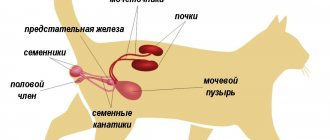- Cats
- General issues
Veterinary practice shows that at least 60% of all cat owners today immediately consult a veterinarian about castration of their pets. And this is very good, since a reasonable approach to keeping pets can reduce the number of stray cats. The only difficulty that many breeders face is the best age to castrate a cat. The fact is that this nuance still causes a lot of controversy among both veterinarians and animal owners themselves. In this article we will try to describe all the periods that are most suitable for castration of an animal.
What is cat castration
Castration of cats is a procedure to stop an animal's sexual activity. By ceasing to produce reproductive hormones, the body loses its reproductive function. This allows owners to resolve the issue of their pet’s sexual behavior. There are various methods of castration:
- medicinal,
- chemical,
- surgical.
Medical castration involves the use of hormonal drugs. Chemical castration involves radiation exposure of the cat's testes. These methods do not always provide a complete guarantee and are unsafe for the health of the animal.
The most popular among owners and veterinary specialists is surgical castration of cats, which modern veterinary medicine classifies as an ordinary operation. This is a 100% guarantee of removal of the gonads. Animal owners should have an idea of how cat castration occurs in order to responsibly approach the issue of preparing the animal for surgery, postoperative care, and understand the existing risks of surgical manipulation. It is also important to know the optimal age of your pet for a safe and effective procedure.
Advantages and disadvantages of castration
Carrying out surgical intervention is not an empty desire of the owner to turn a pet mustache into a soft toy. Such interference in the body has positive and negative sides. Among the advantages of removing the gonads are:
- Reducing manifestations of aggression on the part of the pet. During the period of searching for a female, he becomes conflicted, nervous, and may attack or hiss at a person. After excision of the testes, there will be no need for sexual hunting, and aggression will be reduced to a minimum.
- Reducing unpleasant physical behavior, such as obsessive loud meowing to attract a partner. The cat will not have the need to mark its territory.
- There will be no attempts to escape from home and go on a long journey. The pet will now stay at home or in a well-known yard with great pleasure. He won't want to go out looking for a bride.
- Prevention of urological diseases. Thus, males, thanks to the removal of the gonads, are completely free from testicular cancer or prostate adenoma.
Owners of male cats need to understand that castration of a cat at any time is not a panacea for all health or behavioral problems. Each surgical intervention involves a number of difficulties:
- metabolic disorders and the development of obesity;
- impossibility of using a male for mating;
- probable complications in the form of the development of urolithiasis.
In fact, there are few hassles after the process, and some of them are easy to deal with. To avoid problems with digestion and salt deposition, it is enough to reduce and adjust the animal’s diet.
Reasons for castration of cats
Opponents of the operation say that this procedure is inhumane and even criminal, representing an unnatural intervention in natural processes, and leading to the disability of a helpless creature. Some even call it a clear manifestation of selfishness. Nevertheless, castration is a good way to adapt a domestic cat to atypical living conditions at home.
This is interesting! Animal psychologists consider the castration procedure not only useful, but also necessary. The point is primarily in the physical and psychological health of the pet.
Adults who have reached sexual maturity can spend most of their lives fighting for territory and the cats on it . As a result, every defeat or loss of some area of the yard is a great stress for the animal. And cat fights do not provide anything useful - the animal receives injuries of varying severity, and in some cases becomes infected with infectious diseases and parasites.
The process of mating with yard cats is even more dangerous than fighting. If the female is sick, she will definitely give this disease to the “groom”. And that’s okay, the cat can be cured. But what to do with the huge number of stray kittens, which in the future will also give birth to the same number of unfortunate, useless animals, doomed to die on the street from hunger, cold and infectious diseases?
So what if the cat, after the operation, ceases to be considered the “owner of the yard”? Do you think it means anything to him? Hardly. Most likely, a satisfied cat will chase birds around the yard, bask in the sun, and he will absolutely not care how many “brides” the neighbor Ryzhik has. Therefore, when making a decision, you should not be led by your own convictions, but act solely in the interests of your four-legged friend.
Should you believe castration myths?
Perhaps the most common and strangest misconception is to think that a cat’s behavior is completely similar to a person’s. The owners believe that they will deprive their pet of the “joy of love” or “manhood,” but this is a huge misconception. Mammals (with the exception of humans and dolphins) do not experience pleasure from intercourse; sex hormones dictate certain actions to them.
Perhaps, only if the cat protects the territory of a private house from other cats, raccoons, hedgehogs and others, does he need to stay with the testes. But then be prepared for his constant fights, injuries and absences for adventures. Unneutered village cats live significantly less than their domestic counterparts, and their lives are far from easy.
Therefore, if you have an exclusively pet kitten, you need to take it for a minor operation. And in order not to worry, get acquainted with common myths that are not justified in any way:
- Cats become lazy and get fat
. A cat that has been castrated at a fairly mature age (after about 7-8 years) can become lazy. In all other cases, the animal remains active and cheerful. As for obesity, any four-legged animal with improper nutrition will gain excess weight, so the question is not the operation, but what you feed your cat. Choose good food or create a natural menu under the guidance of a veterinarian - and everything will be fine.
- The animal will become aggressive
. This myth has been debunked by many counterexamples. It is uncastrated males, unsatisfied in their desire, who become very angry (not all, but many, especially by the age of 5-8). Their nature is to fight for females, and if they do not fight with their relatives, they will get it from their owners. There are more than one or even a thousand stories about how cats seriously injured their owners, and it was all due to raging instinct. Unfortunately, late castration will not save such individuals - we can only talk about euthanasia, since the animal becomes dangerous to others.
- The cat will have problems with the genitourinary system
. Again, it all depends on feeding and not on minor surgery. If you choose the right diet and give your animal only clean bottled water, urolithiasis will bypass it.
- Surgery is a big burden on the body
. With a small error we can agree with this statement, but! Nowadays, most veterinarians use light anesthesia, from which the cat recovers very quickly. The operation itself is not abdominal, so the risks of complications are minimal. The very next day the pet returns to its normal life and does not experience any discomfort.
In conclusion, we can say that some cats, even after castration, continue to perform “acts” with a cat, a chair leg, a blanket, a soft toy, etc. This means that the cat remains a “man,” which is important for many owners.
Pros and cons of the operation
If you castrate a cat before his first spree, you can get rid of the following for the rest of his life:
- aggression;
- cat marks in the house;
- surges in the animal's hormonal levels.
Statistics say that sterilized pets are calmer, more playful and affectionate. They scream less and live 1.5-2 years longer than their full-fledged counterparts. It is also important that the operation completely prevents the risk of prostatitis in a cat.
- Urban dog breeds
- Origin of the cat
- Hypoallergenic dogs
- Fighting dog breeds
- The rarest cat breeds
- German Shepherd
The negative aspects of sterilization include depriving the animal of its basic instinct to reproduce. This increases the cat's interest in food, which is why neutered animals often suffer from obesity. To control your pet’s weight, you should feed it only food labeled “For sterilized cats,” which is balanced taking into account the characteristics of their body .
The consequences of the operation itself can also pose a danger to the animal’s health, when the pet may have inflamed stitches, bleed, or have problems recovering from anesthesia. Preliminary tests and careful preparation of the animal greatly help to prevent these consequences.
How much does it cost to castrate a cat: compare offers
The market for veterinary services in Russia is quite well developed. There is, of course, a lot of competition between veterinary clinics. There are many differences: in some places a limited range of services is offered, while in others an integrated approach is practiced with many specialists, its own diagnostic facilities and laboratory.
Prices for veterinary services vary in different regions of Russia. On average, you can derive the range of payment for cat sterilization from 1000 to 1500 rubles. How much does castration of a cat cost in Moscow? Since the standard of living in the capital is higher than in the regions, the average cost of the operation is 2000-3000 rubles. We studied the factors that influence pricing and reflected them in the table.
| Type of anesthesia | From affordable to expensive imported products. |
| Postoperative therapy | Removal from anesthesia, immunostimulating complexes, antibiotics. |
| Calling a veterinarian to your home | The cost increases by 500-1000 rubles, but is compensated by the comfort of the owners and time savings. |
| Prestige of the veterinary service | Many clients go “by name”, although sterilization is successfully performed even by veterinarians with little experience. |
We tried to answer the question of how much it costs to castrate a cat in Moscow. The price may vary, but you should understand that it includes different options. An experienced veterinarian can advise you on the best option.
Special protocols are recommended for purebred cats. For example, Britons take a little longer to develop than other breeds, so neutering can be delayed until 1.5 years of age. If you are the owner of a noble breed pet and you are interested in how much it costs to castrate a British cat, include a light three-component anesthesia in the cost of the service.
Differences between sterilization of young and adult individuals
When a female is spayed before her first heat, there is a high probability that only her ovaries will be removed during the operation. This operation is called oophorectomy. If at the time of the operation the cat was already in heat, or even pregnant and giving birth, then the uterus can be removed along with the ovaries during the operation. This procedure is called ovariohysterectomy.
According to the advice of veterinarians, it is better to remove the uterus during sterilization, because over time this organ can begin to become inflamed, which will lead to disastrous consequences. In order for the uterus to be removed along with the ovaries, it is not necessary to wait for the first heat. But before the operation, you need to consult a veterinarian and resolve this issue together.
There are cases where age does not play a role in sterilization. Most often this happens when surgery is prescribed for medical reasons. In this case, it is necessary to undergo tests to check the condition of the animal.
Late castration
Castration of a cat older than 2–3 years is considered late. There are practically no advantages to performing the procedure on adult cats. The only positive point is that the genitals are already formed, which means it will be easier for the doctor to perform the operation.
In what cases is surgery performed on adult animals?
Most often, cats in adulthood and old age are neutered for medical reasons:
- various diseases of the testes;
- urinary incontinence;
- prostate hyperplasia;
- excessive aggression;
- genital injuries.
Important! Some owners believe that castration of an adult pet will help solve problems with territory marking, constant screaming and running away from home. Unfortunately, it is no longer possible to correct the habits and behavior of an older cat.
Possible negative consequences
The owner must clearly understand that castration in adulthood or old age can cause serious damage to the health of the cat and lead to its death.
Possible postoperative complications:
- Coming out of anesthesia is difficult. It is more difficult for an adult cat to recover from general anesthesia, and when local anesthesia is used, there is a possibility of painful shock.
- In older cats, tissue regenerates slowly, so the risk of internal bleeding or wound infection increases. During the recovery period, such a pet needs special care.
- Gaining excess weight. As cats mature, their metabolic rate decreases. As a result of castration, it will slow down even more. With the usual feeding regimen, the pet will develop obesity.
- Development of urolithiasis. The energy needs of an adult cat’s body after surgery are reduced by 25%. Therefore, it is necessary to reduce the nutritional value of the cat’s diet, exclude fish from the pet’s menu, and limit the consumption of dry food.
Recommended age for castration of cats
Cyrano lies sedated as technician assistant Wendy Brackett shaves him before surgery at North Carolina State University in Raleigh, NC, on Thursday, Jan.
26, 2012. The 10-year-old tabby received what is believed to have been the nation's first feline total-knee replacement. (AP Photo/Allen Breed) currently recommended in most countries around the world that male cats be neutered between 5 and 7 months of age.
. It is possible to castrate cats later, but this increases the risk that testosterone-dependent behavior problems may develop.
The reasons for castration at 5-7 months of age are mostly related to safety considerations for this procedure. Most veterinarians believe that at this age there is no need to resort to general anesthesia
, which makes the operation much safer, since the liver and kidneys of small kittens are less developed than those of older animals. Younger kittens may be less able to tolerate the effects of anesthetic drugs and may be less able to metabolize and eliminate them from the body. Recovery time after surgery is longer in kittens, and with general anesthesia there is an increased risk of complications, particularly in the liver and kidneys. Based on these considerations, in order to avoid general anesthesia, many veterinarians recommend castrating cats no earlier than 5 months.
Currently, however, advances in the development of anesthesia have led to the fact that many veterinarians have serious doubts about its danger for kittens under 5-7 months (in other words, they consider it completely safe). The recommended age was established quite a long time ago, back in the days when anesthesia was not as safe for animals as it is now, and relied largely on drugs, unlike modern ones, which have a risk of suppressing the cardiovascular system and increasing the load on the body. kidneys and liver. To avoid complications, it was required that the kidneys and liver were sufficiently developed at the time of the operation. Since modern means of anesthesia are much safer than drugs of the previous generation, the minimum age for castration of cats in veterinary practice has noticeably decreased everywhere.
Are there any disadvantages
for castration at the recommended age of 5 - 7 months? Yes, just like castration at a very early age (see below), some disadvantages are also present with castration at a normal (5 - 7 months) age:
- Some people find it inconvenient to wait up to 5-7 months;
- There is a possibility that up to seven months a cat may be old enough to become the father of unplanned kittens, increasing the number of stray cats;
- Owners who would like to microchip a kitten under anesthesia along with castration believe that the kitten may become lost while waiting to reach the recommended age;
- Many behavioral problems typical of breeding cats may appear before the kitten is 5 months old (urine spraying, aggressiveness). Such problems, having appeared, can take hold and persist even after castration;
It should be noted that according to the sources used in preparing this article, the ability to produce viable sperm and therefore fertilize cats before 30-36 weeks of age (i.e. up to 7 months) is considered unlikely for cats. Cats usually reach full sexual maturity between the ages of 18 months and two years. It is also unusual for cats to begin marking territory and starting fights over cats and to increase their status before reaching one year of age (usually 18 months to two years).
Technique of the operation
Surgical castration itself does not cause any particular problems. An experienced veterinarian performs this procedure in 10-15 minutes, taking into account the time spent preparing for the operation.
The specialist determines which anesthesia technique to use in a particular case: whether local anesthesia is enough, or whether general anesthesia is required. Then all the necessary medications are administered, and the pet is fixed in a special restraint device. If you decide to castrate your cat under local anesthesia, it doesn’t hurt to double check the strength of the clamps. If the cat breaks out in the middle of the operation, nothing good awaits him.
While the anesthetics are in effect, the preparatory part of the work is carried out: the hair on the operating area is carefully clipped and, if possible, shaved. You should not allow anything “foreign” to get into the wound canal, as this leads to the development of purulent inflammation. Then the skin is treated at least twice with antiseptic compounds. It is not necessary to use any “special” means for this purpose: ordinary iodine or potassium permanganate is perfect.
Kitten castration
Veterinarians established the recommended age for castration a long time ago, but now this operation is increasingly being performed on small kittens. The fact is that medicine does not stand still, and modern drugs do not cause as much harm to the body as anesthesia did before. Anesthetic drugs that were used previously required a long recovery period and negatively affected the condition of the kitten’s liver and kidneys. Modern drugs have become safer, which has made it possible to castrate small kittens.
You can castrate a kitten as early as 8 to 12 weeks of age, and this will not lead to complications.
In some countries, there is a law that obliges cat owners to neuter kittens before 12 weeks. Neutering young kittens has many benefits and saves time. A cat who has been neutered at an early age will not have problems such as aggression and territory marking. The kitten undergoes castration at a young age, due to which the operation will build less , because the amount of drugs used is less. Small kittens recover from surgery faster and return to their previous lives.
Also, castration at an early age has disadvantages:
- There is a risk that the kitten will have a hard time with anesthesia, and the drugs will affect the condition of the kidneys and liver;
- There is a risk that while under anesthesia, the kitten will experience hypothermia (lower body temperature).
- After castration, testosterone production stops, which can lead to the cat not developing masculine character traits.
- After castration, a cat can continue to behave like a kitten when it grows up.
- By castrating a kitten, you can lose a promising cat for breeding, because this can only be determined after six months.
- Early castration can lead to urological problems in the future.
It is necessary to castrate a cat at such an early age, or you can wait a little longer, each owner decides for himself. In fact, there is no reason to rush into castration before the animal is six months old.
Castration or sterilization?
There are 2 ways to terminate reproductive function in cats:
- Castration is an operation for the radical removal of internal genital organs (ovaries in cats and testicles in males). After this procedure, the natural reproductive instinct practically disappears, or the pet reacts to it very calmly.
- Sterilization is an operation using surgical methods, when the reproductive organs (fallopian tubes in females and seminal ducts in cats) are left in the body, but their main functions are deprived. The animal retains its instincts and behavior during attraction, but such an animal no longer produces offspring.
Something else interesting: How and what to feed a cat after sterilization
If sterilized cats do not have the opportunity to realize their “urge,” this can harm the animal due to hormonal changes. Therefore, owners need to think about what conditions they can provide for the pet, and what method of stopping playback to choose.
IMPORTANT! The opinion of veterinarians is that castration is better for the animal, since complete suppression of the function keeps the animal hormonally calm and healthy.
What to do if the most suitable period for castration is missed?
For an adult cat, from 1 to 7 years old, according to veterinary clinics, such an operation does not threaten anything terrible. However, having passed the extreme age of seven, the cat begins to age, and castration can result in death for him.
Taking this issue seriously, you must not miss the best moment when you can castrate a cat quite painlessly, and then the main negative consequences will not affect him.
Although there may be many reasons why the owners could not do this on time. Someone is afraid, worried about the health of their furry pet. Someone was unfamiliar with the specifics of the physiological development of cats. But when a decisive factor appears, when patience comes to an end and the whole house seems to be saturated with a pungent unpleasant odor, most loving owners are simply forced to take such radical measures.
About the types of castration
It is generally accepted that castration is exclusively a surgical operation, the meaning of which is to remove the testes, but this is not so.
Yes, surgery is indeed used most often due to its high efficiency, simplicity and low cost, but there are still several types of this procedure:
- Classic surgical castration , which will be discussed in more detail below.
- Drug sterilization , in which an implant is sewn under the skin of the animal, gradually releasing drugs. They suppress the cat's libido. The method is convenient, but very expensive. In addition, in recent years, veterinarians increasingly believe that medical hormonal castration can have an extremely detrimental effect on the health of pets in the future.
- Chemical castration. In this case, special chemicals are injected directly into the testis. The organ degrades from the action of drugs, its tissues are replaced by connective tissue “patches”.
- Radiation sterility. The testes are irradiated under a source of directed gamma radiation. This technique is considered the most advanced today, since the risks of complications are completely absent, and the cat’s sexual function is reliably suppressed.
But still, the last three of the methods we described have not received much widespread use in our country. More than 90% of veterinary clinics still practice this particular method of deworming, and therefore it is necessary to talk about it in more detail. Moreover, for a three-year-old cat, surgical castration is ideal; negative consequences develop extremely rarely.
Postoperative care
On the first day after surgery, it is necessary to constantly monitor the pet’s condition. Coming out of narcotic sleep lasts 1–3 hours, but the consequences may persist for the next half day: drowsiness, weakness, loss of coordination.
Lay a soft blanket on the floor with a moisture-absorbing diaper on top - it will be an excellent bed for the animal. Chairs and beds are not suitable now, as the cat may fall from them . Monitor body temperature, evenness of breathing, turn your pet over to the other side every half hour so that its limbs do not become numb. Touch your nose and ears to check the reaction - the more active it is, the faster the anesthesia will end.
After waking up, do not forget to pay more attention to the cat. Don't let him jump onto high places - there is a risk of falling and injury.
After 5-6 hours, give the animal something to drink, and a day later offer a small portion of light food. Immediately place a clean tray next to your pet - it will be difficult for him . Don't punish mistakes; this is due to poor coordination. Use a special collar to prevent your cat from getting infected by licking the wound. You need to treat the incision site with regular brilliant green or a product recommended by a veterinarian. After a couple of days, the wound will heal, and the animal will regain mobility, as well as playfulness and a good mood.
Features of the procedure
Castration of cats of different ages has its own characteristics. The owner should familiarize himself with them before carrying out the procedure.
At 2–3 years
Castration of 2-3 year old cats is carried out under general anesthesia. Local anesthesia may not work at this age. There is no need to radically change the cat’s diet, because growth at this age has not stopped yet, and the metabolism is quite fast.
It is recommended to give fish and dry food 3-4 times a week, clean drinking water should always be freely available.
At 4 years old
Veterinarians consider 4-year-old cats to be fully grown. Before castrating a pet of this age, you should pay attention to the following nuances:
- The operation is performed exclusively under general anesthesia. For a cat at this age, local anesthesia will be ineffective and will lead to the development of painful shock.
- It is better to ask the veterinarian to perform the operation in the morning. This way, the owners will have the opportunity to monitor the pet’s condition as it recovers from the state of anesthesia.
- 4-year-old cats often gain excess weight after castration, so mandatory adjustments to their diet will be required.
At 5–6 years old
Even in the best catteries, cats at this age are removed from breeding and then castrated. 5–6 years is the maximum age for castration of a cat without dangerous consequences for his life and health.
Before surgery, you need to bring your pet for examination to the following specialists:
- Radiologist – to perform a chest x-ray.
- Ultrasound specialist - to assess the condition of all internal organs.
- Cardiologist - to conduct an ECG and detect possible diseases.
- Anesthesiologist - to take a sample for allergies to anesthetic drugs.
In addition, you need to take urine, feces and blood tests to detect existing diseases in advance.
Almost all adult cats recover from anesthesia very difficultly and for a long time, and their risk of developing various complications is quite high. From the moment of the operation, they must be under the constant supervision of a veterinarian for 3 days.
After 7 years
Some owners neuter cats aged 7 years and older. They believe that surgery will help correct the pet's bad behavior, but this will not happen.
Not all veterinary clinics undertake such an operation, because it is associated with enormous risks. A cat at such an advanced age may not tolerate anesthesia. After castration, you will have to significantly adjust your pet’s menu, otherwise in a short time he will develop urolithiasis and gain weight.
Important! The only good reason to castrate a cat at this age is for medical reasons.
Preparation period
Mandatory conditions for preparing a cat for sterilization are:
- 12 hour diet. This is due to the fact that anesthesia can cause the animal to vomit if there is food in the cat’s stomach. Aspiration of vomit causes a dangerous disease - aspiration pneumonia;
- The cat should not be given water to drink within 2–3 hours;
- treatment for worms. Carried out 10 days before sterilization;
- vaccinations. If the animal is not vaccinated, there is a risk of contracting an infectious disease after surgery.
What should be done after castration of an animal?
The pet should be placed in a warm place. You should not place him on a bed or sofa, from which he could fall and injure himself. Water should be given 3-4 hours after the operation, and food only the next day to prevent vomiting. The wound is simply observed during the rehabilitation period. If it becomes inflamed and the swelling does not go away on the third day after orchidectomy, urgent consultation with a specialist is required.
| Diagnostics | Prevention |
| Vaccination | Surgery |
| Hospital | Sterilization |
| Castration | Therapy |
| Traumatology | Analyzes |
| Ultrasound for cats | Dental sanitation |
| Day hospital | Obstetrics |
| Obstetrics gynecology | Ringworm in a cat |
| Poisoning in cats | Funeral services |
Postoperative care
The easiest way to care for an animal after local anesthesia: the main difficulty is to eliminate the effects of stress, which is quite simple for a loving and attentive owner. Although it doesn’t hurt to ask in advance what sedatives you can have in case of emergency. Then all that remains is to properly treat the wound - the doctor will give advice on such care.
After general anesthesia, the first two days will be especially difficult. The animal can sleep no longer than five hours, often waking up earlier. While the cat is sleeping, you just need to check the integrity of the reflexes: touch the ear - if it twitches, then everything is in order.
The behavior of a cat after castration on the first day requires utmost attention, since the animal is always disoriented after anesthesia: there is no need to disturb the cat at this time, but you should constantly make sure that it does not harm itself. It is impossible to unambiguously describe how cats behave after castration: it depends on many factors - the state of the nervous system, the level of stress received, general physical condition, the behavior of the people around them, and the character of the animal.
An important point is to care for the wound, especially in the first days: the cat can damage the seam when licking. Therefore, you either need to monitor him constantly, which is somewhat difficult: it is easier to wear a collar after castration of a cat - usually 4-6 days are enough. It is imperative to use an “Elizabethan collar” if the cat has infectious problems, especially in the oral cavity.
In addition, you need to remember about possible complications and be ready to always consult a doctor again: this is required by sudden changes in the color of the mucous membranes and swelling, heart rhythm disturbances, an increase or decrease in temperature, and breathing problems.
WHERE IS IT BETTER TO CARRY OUT THE OPERATION - IN THE CLINIC OR AT HOME?
It is better and safer to do any abdominal surgery in a veterinary clinic. In an operating room there are more opportunities to take emergency measures if something suddenly goes wrong.
It’s even better if the clinic provides a postoperative hospital service. Then your pet will be under the supervision of specialists throughout the crisis period. Of course, emergency measures are not always required.
Typically, young and healthy cats tolerate ovariohysterectomy well and, with minimal care recommendations, recover well at home. You will only need one more visit to the clinic to remove the stitches.
pros
sterilization in the clinic
: all necessary conditions for the operation are provided, the risk of emergency situations is reduced, and there is a high probability of overcoming them.
Minuses
sterilization in the clinic
: the owner’s time spent traveling and waiting for the end of the operation.
Despite the obvious advantages of surgery in a veterinary clinic, sterilization of cats at home is also practiced by most veterinarians and, with proper training and responsibility of the specialist, is technically no different from surgery in a clinic.
The advantage of sterilization at home is the absence of stress for the cat from traveling and being forced to stay in a place that is foreign to it (some cats are terrified of leaving the apartment), as well as the absence of risks of contracting infectious diseases (if the animal is not vaccinated). In addition, the doctor can be invited at a time convenient for the owner, which is also very important for people who are constantly busy at work.
Disadvantage of surgery at home : it is difficult to ensure high-quality sterility.
Video
Types of castration
Among the most common options for castration, there are three methods:
- open;
- closed;
- vasectomy.
Public method
The open method is considered the most popular, moreover, most cat owners consider it the only one, but in practice this is far from the case. Open castration involves the surgeon performing the following manipulations:
- Stretching the scrotum in the area of the testes, making an incision.
- Extraction of testes.
- Pulling the scrotum towards the inguinal ring in order to extract the spermatic cord.
- Applying a ligature to the cord.
- Cutting the cord and suturing the wound.
The open castration method is excellent for young and healthy individuals.
Video - Open castration of a cat
Private method
The closed method is considered more gentle, and therefore more suitable for older cats or cats with an intravaginal hernia or wide inguinal rings (the risk of prolapse after surgery is quite high).
For closed castration, the procedure is as follows:
- Stretching the scrotum.
- Cutting the skin (while the membrane remains intact).
- Detachment of the membrane from the walls of the scrotum.
- Rotation of the shell along with the testis by 180 degrees.
- Applying a ligature near the inguinal ring.
- Removal of testes with appendages a centimeter below.
- Stitching the wound.
The closed castration method seeks to minimize the number of tissues cut
Vasectomy
The closed method is bloodless and does not involve opening the scrotum during surgery. The main focus of a vasectomy is on destroying the vas deferens, which prevents sperm from entering the cat's penis. Blockage of the vas deferens is not accompanied by dissection of blood vessels or nerves, and therefore the testes remain intact and continue to function.
Vasectomy does not always lead to complete loss of sexual desire
One of the positive aspects of a vasectomy is that there is no need for general anesthesia: cats only need to be given local anesthesia so that they can easily undergo the operation. This greatly facilitates their further recovery and reduces the likelihood of all kinds of complications.
How to prepare your pet for castration, which involves general anesthesia, can be read below. more about preparing a cat for the sterilization process in our special article.
Preparing a cat for castration
Non-surgical castration
In addition to the well-known castration methods listed above, there are alternative methods that, for various reasons, are not widespread in Russian veterinary clinics. The main types of castration without using a scalpel are given in the table below.
Table. Types of non-surgical castration
| View | Description |
| Castration by irradiation | This method involves the use of radiation directed at the testes and appendages of the pet. The dose of radiation contributes to a natural decrease in the cat’s sexual activity, but quite often leads to serious negative consequences in the form of testicular cancer. Due to the high risks, modern veterinarians prefer to refuse castration by irradiation |
| Chemical castration | Castration is performed using injections of drugs based on megestrol acetate (it is also possible to use this substance in tablet form). Megestrol acetate has an inhibitory effect on sex hormones and leads to a decrease in sexual arousal in cats. However, the overall effect of this drug on the body remains in question, as does the duration of its action. The need to periodically inject a pet with injections repels many owners. In this regard, chemical castration is not offered in all veterinary clinics. |
| Microwave castration | Castration is carried out using a special microwave emitter, the action of which leads to a lasting result. Once an animal has been treated with such rays, it will not need repeated procedures. The method is not widely used due to the fact that not all veterinary centers can afford to purchase an emitter. There is also no sufficient research base to allow veterinarians to say with confidence that such radiation will not cause long-term harm to the cat’s health. |
How many years do castrated cats live at home?
There are no statistics, but experts say: much longer than their counterparts, who are forced to look for a mate every year. It is worth bringing your pet to an appointment with a veterinarian in any case: this will help to avoid escapes, fights with rivals during a walk, the development of a prostate tumor, adenoma and other diseases that require complex treatment and bring your pet to the operating room.
There is a separate conversation about purebred cats. They should be neutered if they are not being bred. Do you need blue blood kittens? Then leave the male his “dignity”. And if your pet cannot regularly satisfy its needs and you do not need purebred babies, make an appointment with the veterinarian and wait your turn.
We have already talked about at what age a cat needs to be castrated and how to understand that this should be done - the animal has not yet had time to experience all the delights of the “transitional” period of puberty, he is one year old, you live relatively calmly, but this is just the calm before the storm .
Our advice is this: do not listen to those who call removal of the testes barbaric and a mockery of the animal. If you cannot allow the male to participate in mating games, and you do not want to endure the screams and the strong smell of urine, plan an operation. Try to carry it out before the pet turns one year old, but not earlier than 7-8 months.
Cost of castration
| Service | Unit change | Price, rub |
| Castration of a cat | 1 head | 2600 |
| Castration of a cat (subcutaneous cryptorchidism) | 1 head | 3500 |
| Castration of a cat (abdominal cryptorchidism) | 1 head | 5000 |
View all prices
What is special about castration of an adult cat?
Removing the testicles at a young age (before 1 year) is safer. The animal does not experience severe stress after surgery. The kitten has not yet had time to walk with the females. He doesn't know what mating is. He lacks the reproductive instinct.
In adult animals, adaptation is more difficult. Most likely, such a pet walked with cats, so the desire to mate may remain even after the removal of the testes. In addition, in 30% of cases, adult cats continue to mark after surgery, but with urine.
The peculiarity of castration of older pets is the need for the correct selection of anesthesia. Anesthesia increases the load on the heart, which is fraught with complications in the postoperative period.
Before prescribing anesthesia, the veterinarian conducts a comprehensive examination of the animal:
- performs an ultrasound of the heart and abdominal organs;
- takes blood for analysis;
- examines urine and feces;
- does a cardiogram;
- Conducts a drug allergy test.
Otherwise, surgical intervention is no different from that performed in cats under 1 year of age.
Elderly pets (over 7 years old) can only be operated on if there are medical indications. They may include the following disorders and pathologies:
- benign tumors;
- testicular diseases;
- genital trauma;
- oncology;
- prostate hyperplasia;
- hormonal imbalances;
- urinary incontinence.
During the operation, not only the testes, but also the scrotum, as well as dangerous and life-threatening neoplasms of the pet can be removed.
Post-operative care
If you do not provide special care for the operated animal, unpleasant complications may arise:
- Bleeding. Appears if the animal picks at the stitches and wound. Bleeding from the spermatic cord is considered especially dangerous when the pet damages the ligature, which can be fatal.
- Inflammation. Immediately after surgery, a slight inflammation is normal, but if it becomes purulent, the animal’s body temperature rises, and an unpleasant odor emanates from the wound, then you need to seek help from a specialist.
- Edema. It is characterized by swelling of the scrotum and adjacent tissues; often with severe swelling, the scrotum increases in size. You should contact your veterinarian, as swelling indicates inflammation. Also, accumulated transudate can cause other complications.
- Hernia . This pathology usually occurs in old animals. The tissue that falls out can have different shapes, and their color varies from bright pink to red shades. Later, the hernia acquires brown, blue or black flowers (a sign of necrosis). A hernia can only be repaired in a clinic. Dead tissue must be cut off.
- Blood poisoning. It is a consequence of the neglected complications listed above. Due to bacteria in the blood, the animal’s temperature rises by 3-4°C, the pet is in serious condition, has difficulty moving, and refuses food and water. Sepsis is treated with antibiotics.
Arguments of opponents of castration
photo from the site: keyword-suggestions.com
- This procedure is extremely painful and dangerous to the health of the animal - this is not true, because the surgery is performed using anesthesia. Your four-legged friend will not feel anything - he will sleep peacefully. Postoperative recovery will take several days.
- It would be a pity to castrate a cat - are you ready to provide all the conditions for regular mating? But your animal is not being bred and you don’t see a need for it. Then such an argument is simply another confirmation of the existence of double standards. If you really feel sorry for your pet, think about how hard it is for him when he asks to go outside, knowing that he will not be allowed out. Do you really want the animal to mark in the apartment and show aggression towards household members?
- Cats whose testes have been removed are more likely to develop urolithiasis - this disease appears if the operation was performed at an early age, which caused inhibition of the development of the urethra. We will discuss the causes of such complications in more detail below. Before that, we’ll give you one piece of advice: don’t rush. Allow the animal’s body to strengthen and develop.
Castration is not an execution, but a sure way to make life easier for both yourself and your pet. And that's why:
- A cat whose testes have been removed is less likely to get sick. This is a proven fact. The risk of testicular cancer is reduced and the pet’s quality of life increases.
- The animal will not be sexually active. And along with it, the constant cat concerts, tags, the unbearable smell that spreads throughout the apartment at the speed of light, and changeable behavior (sharp manifestations of aggression) will disappear.
- Cats that have survived castration will not run out of an open door. You will not lose them in the country or in the city and will be calm about the life and well-being of your pet.
- Often individuals, over whom their compassionate owners have taken pity, lose their fur and lose weight due to the absence of a female.
Above, we gave a detailed explanation of why to castrate a domestic cat, whether it is necessary to do it, and we will tell you further about when it is worth taking the animal for surgery. By the way, a similar procedure exists for cats. Read more about it here.











